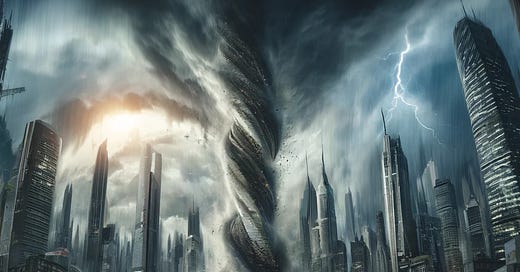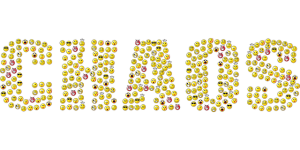An Uncertain and Anxious World
The danger of war is imminent and there is great anxiety and uncertainty.
“Have patience with everything that remains unsolved in your heart.
...live in the question.”
― Rainer Maria Rilke, Letters to a Young Poet
“The mistake is thinking that there can be an antidote to the uncertainty.”
― David Levithan, The Lover's Dictionary
"The future is uncertain, but this uncertainty is at the very heart of human creativity." ~ Ilya Prigogine
"We live in uncertain times when it comes to the future of life on Earth." ~ Jeff Corwin
The present time is a time of great uncertainty and anxiety. There is a genuine threat of World War 111, an all-out nuclear war, as Israel and Iran are at the edge of war. That can lead to catastrophe.
A catastrophe is an event or situation that causes great and often sudden damage, suffering, or loss of life. It can be caused by natural disasters like earthquakes, hurricanes, and floods or by human factors like wars, accidents, or terrorist acts. A catastrophe can have significant and long-lasting effects on individuals, communities, and even entire countries.
Uncertainty is a situation where there is no perfect or even partial information. It appears virtually in all domains of human curiosity, be it science, business, medicine, or our everyday decisions. Recognizing and handling uncertainty is critical to accurately assessing the information we receive, improving decision-making, and encouraging more open thinking.
Besides the danger of war, uncertainty appears to be the new constant phenomenon affecting diverse aspects, including the global economy and personal life. Now we face the uncertainty of war.
One of the most prominent areas of uncertainty, besides the threat of war, is the global economy. Many factors, such as geopolitical struggle, trade wars or disputes, and unprecedented global changes like pandemics, may disturb and alter the course of the economy.
For example, the recent COVID-19 pandemic significantly changed the world’s economic landscape. It altered economic predictions based on annual trends, enabling the overcoming of many periods of unemployment and market instability.
Today, businesses and individuals cannot predict their future investments in an unpredictable economy.
Climate change is another layer of uncertainty. More severe storms, such as tropical storms, wildfires, and flooding, make it impossible for people and entire areas to prepare for them and complicate scientists' ability to forecast them for the foreseeable future. This level of environmental uncertainty also influences policymaking, the insurance industry, disaster preparedness, and flight. These are only a few examples of continuous social and economic uncertainty.
While advancement in technology is often portrayed as progress, it is also related to uncertainty. In fact, technology like artificial intelligence and machine learning can promise a revolutionizing impact on industries in terms of efficiency and new avenues. Similarly, the same alternatives create concerns as they may relate to job loss, privacy issues, and the morality of the use. Because technology is ever-changing, regulation and law are often five steps behind, leaving a significant window for uncertainty.
Political uncertainty plays a significant role in societal concerns. Leadership changes, policies, and even social movements can change the country and the global landscape. For example, election outcomes can restructure immigration law and health care policies, significantly affecting the lives of many.
On a more individual level, people experience uncertainties related to personal health, career development, and relationships. Health crises like the one the world is currently experiencing remind people that life is fragile and one’s health is not forever predictable.
Career-wise, the technological revolution offers chances but also risks that individuals will have to navigate as the market shifts and transforms. For example, there is a genuine danger that the advances in artificial intelligence can lead to vast unemployment.
However, we accept that these changes are happening because acceptance involves acknowledging the limits of our control and acknowledging that there are many factors we can neither know nor influence. We must develop resilience to overcome challenges.
Acceptance of uncertainty allows for better risk management. When we acknowledge the extent of our knowledge and the range of outcomes, we can be better prepared for the unexpected and avoid becoming overconfident. This is especially vital in fields such as finance, business, and military planning, where excessive certainty can lead to huge financial losses or deadly mistakes.
Accepting uncertainty encourages growth. When people realize they cannot control or know everything, they become more curious about the world around them.
It reduces the fear of being proven wrong and increases the willingness to take risks.
Greater curiosity and a willingness to take risks lead to personal growth.
More acceptance of uncertainty may help mental health. Many times, anxiety and stress follow uncertainty because people must assume greater responsibility for the results.
By understanding that not everything is within our control, people are more likely to focus on what they can control. As a result, they feel less worried and take more initiative in dealing with life's challenges.
Finally, acceptance of uncertainty promotes resilience. Life is ever-changing and unpredictable. Acceptance of uncertainty may lead to a balance between being neutral and emotional when difficult situations arise.
Understanding uncertainty can also result in better decision-making. The concept of uncertainty allows people to consider their choices, considering multiple probable outcomes, making them more educated and contemplative. It means that individuals can appreciate risks more normally, limiting the negative effects of overconfidence. In this way, accepting uncertainty does not equate to resignation but enables awareness and preparedness for the complexity of life. This acknowledgement helps a person live a more balanced and wise life. It is also important to keep in mind that it is not unusual for uncertainties to occur.
Thus, it is also vital to acknowledge and accept this because fear of the unknown can create anxiety about the future, creating a potentially toxic approach to problems. There are the following strategies for dealing with the state of uncertainty:
Practicing mindfulness and meditation helps avoid thoughts spiraling out of control and putting a person in an anxious state. Regular meditation sessions allow people to be in the moment and reduce concerns about the future.
Creating and fulfilling routines also helps when a person is aware of uncertainties. They give structure to a person’s life even when something unexpected occurs.
While staying aware of recent developments is crucial, information overload should be avoided. Too much information can worsen rather than lessen anxieties.
Focusing on expectations one can control helps them feel empowered rather than helpless.
Regular exercise is also good at reducing stress.
Remaining in touch with loved ones and consultants also has its central place;
It is also important to take it easy and practice self-compassion.
Ultimately, the greatest fear is of the world and our lives descending into chaos. Chaos refers to a state of complete disorder and confusion. In scientific terms, chaos theory studies the behavior of dynamic systems that are highly sensitive to initial conditions, leading to unpredictable outcomes. Chaos is often used to describe situations that are out of control, disorganized, and lacking any obvious pattern or structure. And that is very scary.








